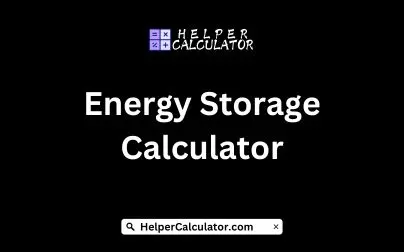The Energy Storage Calculator helps you calculate the amount of energy stored in an electrical system based on the potential difference (voltage) and the electrical charge. This is particularly useful in understanding how much energy is stored in capacitors, batteries, or other energy storage devices. The tool uses basic principles of electricity to quickly determine the energy storage in joules (J).
How it works:
This calculator requires two inputs:
1. Potential Difference (V): The voltage (in volts) across the energy storage device, such as a capacitor or battery.
2. Electrical Charge (C): The total electric charge (in coulombs) stored in the device.
Formula:
The energy stored in an electrical system is calculated using the formula:
E = Q x V
Where:
- E is the energy stored (in joules).
- Q is the electrical charge (in coulombs).
- V is the potential difference (in volts).
Example:
If the potential difference is 10 V and the electrical charge is 5 C, the energy stored is:
E = 5 x 10 = 50 J
This means 50 joules of energy are stored in the system.
Key Features:
- Instant Calculation: Quickly calculate the energy stored in capacitors, batteries, or other devices based on voltage and charge.
- Useful for Energy Systems: Essential for engineers, physicists, and students working with energy storage devices.
- Simple and Effective: A user-friendly tool to help visualize how energy is stored in electrical systems.
This calculator is ideal for anyone involved in studying or working with energy storage, including in electronics, electrical engineering, and renewable energy systems.
